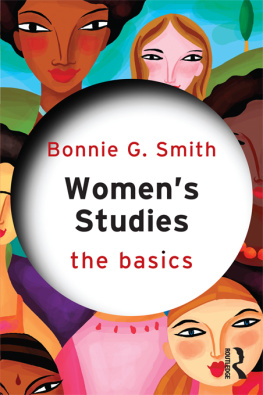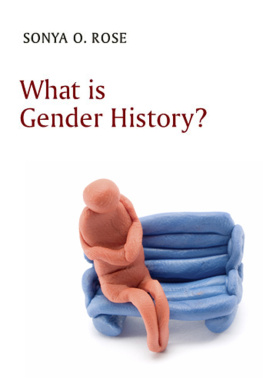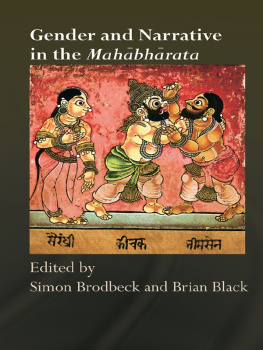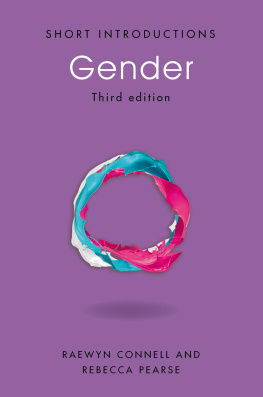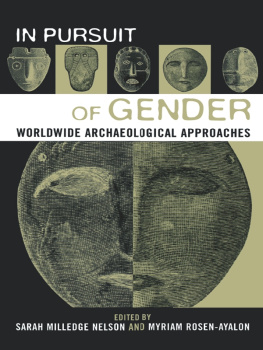Gender and Qualitative Methods
INTRODUCING QUALITATIVE METHODS provides a series of volumes which introduce qualitative research to the student and beginning researcher. The approach is interdisciplinary and international. A distinctive feature of these volumes is the helpful student exercises.
One stream of the series provides texts on the key methodologies used in qualitative research. The other stream contains books on qualitative research for different disciplines or occupations. Both streams cover the basic literature in a clear and accessible style, but also cover the cutting edge issues in the area.
SERIES EDITOR
David Silverman (Goldsmiths College)
EDITORIAL BOARD
Michael Bloor (University of Wales, Cardiff)
Barbara Czarniawska (University of Gothenburg)
Norman Denzin (University of Illinois, Champaign)
Barry Glassner (University of Southern California)
Jaber Gubrium (University of Missouri)
Anne Murcott (South Bank University)
Jonathan Potter (Loughborough University)
TITLES IN SERIES
Doing Conversational Analysis
Paul ten Have
Using Foucaults Methods
Gavin Kendall and Gary Wickham
The Quality of Qualitative Research
Clive Seale
Qualitative Evaluation
Ian Shaw
Researching Life Stories and Family Histories
Robert L. Miller
Categories in Text and Talk
Georgia Lepper
Focus Groups in Social Research
Michael Bloor, Jane Frankland, Michelle
Thomas, Kate Robson
Qualitative Research Through Case Studies
Max Travers
Methods of Critical Discourse Analysis
Ruth Wodak and Michael Meyer
Qualitative Research in Social Work
Ian Shaw and Nick Gould
Qualitative Research in Information Systems
Michael D. Myers and David Avison
Researching the Visual
Michael Emmison and Philip Smith
Qualitative Research in Education
Peter Freebody
Using Documents in Social Research
Lindsay Prior
Doing Research in Cultural Studies
Paula Saukko
Qualitative Research in Sociology:
An Introduction
Amir B. Marvasti
Gender and Qualitative Methods
Helmi Jrviluoma, Pirkko Moisala and Anni Vilkko
Helmi Jrviluoma, Pirkko Moisala and Anni Vilkko 2003
Bruce Johnson acted as English translation editor
First published 2003
All rights reserved. No part of this publication may be reproduced, stored in a retrieval system, transmitted or utilized in any form or by any means, electronic, mechanical, photocopying, recording or otherwise, without permission in writing from the Publishers.
 | SAGE Publications Ltd
6 Bonhill Street
London EC2A 4PU |
SAGE Publications Inc.
2455 Teller Road
Thousand Oaks, California 91320 |
SAGE Publications India Pvt Ltd
B-42 Panchsheel Enclave
Post Box 4109
New Delhi 100 017 |
British Library Cataloguing in Publication data
A catalogue record for this book is available from the British Library
ISBN 0 7619 6584 x
0 7619 6584 8
Library of Congress Control Number available
Typeset by C&M Digitals (P) Ltd., Chennai, India
Printed in India at Gopsons Papers Ltd, Noida
Contents
Preface and Acknowledgements
Late in an August evening 2002 we three writers were drinking toasts at the Kolme Kruunua (Three Crowns) restaurant in Helsinki. Nearby in the Senate Square, the mayor of Helsinki had just finished hosting her annual popular music concert. We had planned to treat ourselves with music after finishing a five-year project: the manuscript of the textbook you are holding.
As usual, the final corrections, the printing, and packing the pages neatly to be sent to Sage took far more time than we had planned. We didnt make the concert, but actually we didnt mind. After five years of planning, collecting materials and bibliographical information, writing, re-writing, translating, negotiating, getting inspired, being desperate, arguing and sulking, melting, laughing and editing, we were nearly there.
This book is practical guide for recognizing gender/ing in different kinds of research materials. We show a selection of possibilities to analyse gender as something which is not given, but which is always negotiated and performed. In addition, this book is also a performance, prepared by the three of us Helmi, Pirkko and Anni in countless negotiations. Writing itself is always a process, and this book is one important step for us in our thinking and writing about gender. You can read more about our own positions in relation to qualitative gender studies at the end of .
Some kind of narration, however, can be constructed about the history of this book. In 1997 the series editor, David Silverman, contacted his former student, Helmi Jrviluoma, suggesting the idea for the book. After pondering alone upon the subject for a short while, she contacted here colleague Pirkko Moisala, and together they started to intensively plan the contents and collect the bibliography. Helmi was able to write some of the book while working as a researcher in the Academy of Finland; and so did Pirkko at the last stage of the writing process thank you the Academy of Finland. Finally, Anni Vilkko was recruited as a welcome new member of the team. In fact, it is better to say that a new team, or triad, was created. Everybody commented on each others texts. Examples, exercises and bits and bites of text were transferred between the writers during the writing process. Helmi started with the journal Sosiologia for permission to use some parts of an earlier MCA article by Irene and Helmi.
We would like to thank the friendly and professional staff of Sage Publications, especially Louise Wise, Karen Phillips and Ian Antcliff. Associate Professor Bruce Johnson from the School of English in the University of New South Wales acted as a Translation Editor for us, for which we are very grateful. Without the series editor, David Silverman, the book wouldnt exist. We are thankful for his support and patience. Thanks are also due to Helj Mntyranta, Soili Keskinen and Taru Leppanen, the editors of the journal Nuorisotutkimus, and to all colleagues, friends and family members from whom we have received encouragement and support during this project.
13.02.03
Helmi Jrviluoma, Pirkko Moisala, Anni Vilkko
In the cyberspace between Turku, Lieto and Helsinki
1
Performing and Negotiating Gender
Short history of and overview of gender studies
The Study of men and masculinities
Sexuality and gender
Performativity of gender
Masculinity and femininity
Gender identity
Gender produced by research methods
The necessity of positioning
Deconstructing the tie between feminity and qualitive methodology
Conclusion: towards gender analysis
This book has grown out of the conviction that gender, the cultural construction of femininity and masculinity, cannot be avoided in any research activity. It is present in all human action and its products, including researchers and their research. Gender is an important criterion in identifying ourselves and is central to the way we perceive and structure the world and events in which we participate. It influences all aspects of our being, of our relationships and of the society and culture around us. Gendered conceptualizations, norms (what is considered to be proper behaviour), values (the personal characteristics that are highly valued) and attitudes (the kinds of prejudices that come into play when we meet a person of a different gender), have a profound effect on both the personal and social, the micro and macro levels of our lives.




